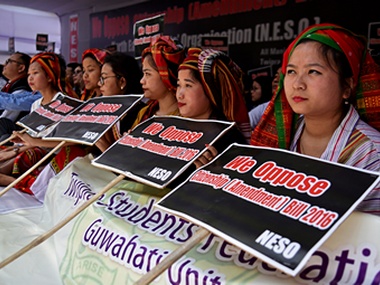The Bharatiya Janata Party (BJP) government at the Centre seems to have put on hold its plans to amend the existing Citizenship Act in order to facilitate the grant of citizenship to Buddhists, Christians, Jains, Hindus, Parsis and Sikhs from Afghanistan, Bangladesh and Pakistan. Clearly, the category that is important here is Hindu since it is somewhat unlikely that there has been any significant migration of Buddhist, Christian, Jain, Parsi and Sikh people from the three countries named in the Citizenship Amendment Bill, 2016. Reports suggest that two reasons were paramount in forcing the government to shelve its plans. [caption id=“attachment_4497601” align=“alignleft” width=“380”] A file image of protesters against Citizenship (Amendment) Bill, 2016. Reuters[/caption] First was the agitation against the Bill in Assam. What the managers of the central government seemed to have lost sight of in their anxiety to consolidate the ‘Hindu’ vote was that Indian society is cleaved along more than one lines of divide. In Assam (and other parts of the North-east), the fault line is linguistic and cultural. Thus, the Assamese-speaking people are less than enthusiastic hosts to the large number of Bengalis who have made Assam their home, regardless of whether they are from West Bengal or East Bengal/East Pakistan/Bangladesh, or whether they are Muslims or Hindus. The agitation against the amendment Bill stemmed thus from the fear that a large number of illegal, Bengali-speaking, Hindu migrants would get citizenship rights and stay on. The second factor was the inability to steamroll the Bill in its current form through the joint parliamentary committee. A BJP member had proposed that the reference to Bangladesh be dropped, while Congress and Communist Party of India (Marxist) members wanted amendments deleting references to religion and the countries the illegal migrants came from. The latter amendments would have completely defeated the political purpose of the Bill, while the former would have significantly diluted it. The choice of countries was also contentious. Senior BJP leader Vinay Sahasrabuddhe conceded that wider consultations were needed in search of a consensus. In any case, it had become clear that the report of the committee would not be ready in time for Parliament’s Winter Session, with the added likelihood of it being ready as a weapon for mobilization in time for the 2019 Lok Sabha elections pretty much dead in the water. The West Bengal unit of the BJP had been counting on a campaign centred on the Bill to bolster its exiguous prospects, albeit for reasons best known to it. Armed with some inexplicable and arcane process of reasoning, it had reckoned that such a campaign would help it wean the scheduled caste Matua community, particularly influential in two Lok Sabha constituencies in the district of North 24 Parganas, away from the Trinamool Congress. It
wasn't making significant headway, but, in any case, that idea just went up in smoke.
But the reasoning that fed into the Citizenship Amendment Bill, 2016, in the first place, offers us a glimpse into how politics based on sectarian and immediate-term calculations promotes perspectives that make people (and parties) miss the woods for the trees. The BJP’s sectarian lens occludes from its vision the complexities of what we now call India. These complexities include the multiple solidarities that exist across ‘communities’ and groups and the multiple fractures between ‘communities’ and peoples. The BJP’s perspective also obscures from it the fact that India has survived as a political unity largely because the Nehruvian frame was designed precisely to both take into account difference and promote a tolerance for it.
Thus, a large part of the reason for the BJP’s decision to perhaps make haste slowly on the amendment to the Citizenship Act is pragmatic. It now realises that it cannot promote what it perceives to be the interests of the majority community across the length and breadth of a sub-continental country because there is no one size that fits all. Unfortunately, the party does not seem to have realized that its Bill was discriminatory and violated provisions of the Constitution – Article 14 – that forbid discrimination and guarantee equality before law to everyone, not just citizens. The amendment bill is clearly discriminatory since it envisages the grant of citizenship to people from some countries and professing certain faiths. Obviously, it is aimed at excluding Muslims, but it also excludes, for instance, Tamil Hindus from Sri Lanka or Jews from wherever. It is at the very least possible that even if the amendment becomes law at some point it won’t survive a legal challenge on these grounds and perhaps others as well. The BJP’s decision to stay its hand might save its alliance with the Asom Gana Parishad, which had threatened to intensify its agitation against the Bill and snap its electoral alliance with the Hindutva party. Conceivably, the BJP might even salvage the electoral and political ascendancy it had gained in the 2014 Lok Sabha elections and 2016 Assembly elections in the state. But the two-step manoeuvre it has executed exposes it once again as a party with a sectarian and obscurantist frame of reference allied to a form of politics that privileges electoral calculations above everything else. Electoral calculation lies at the heart of what all parties do, but the BJP in its current avatar has become so obsessed with perfecting the art of winning elections by converting itself into a perfect machine geared to this one purpose that it has become virtually incapable of functioning as a party of governance.


)

)
)
)
)
)
)
)
)



